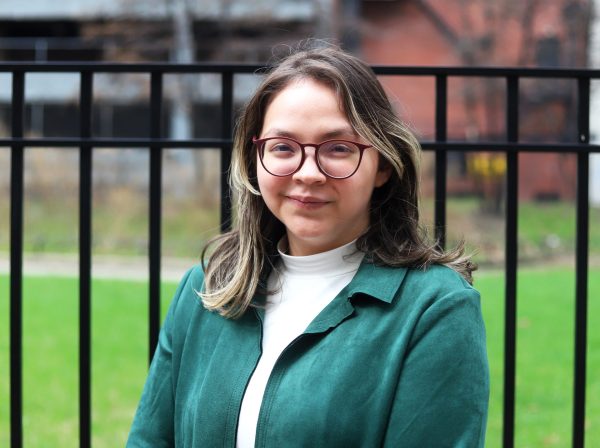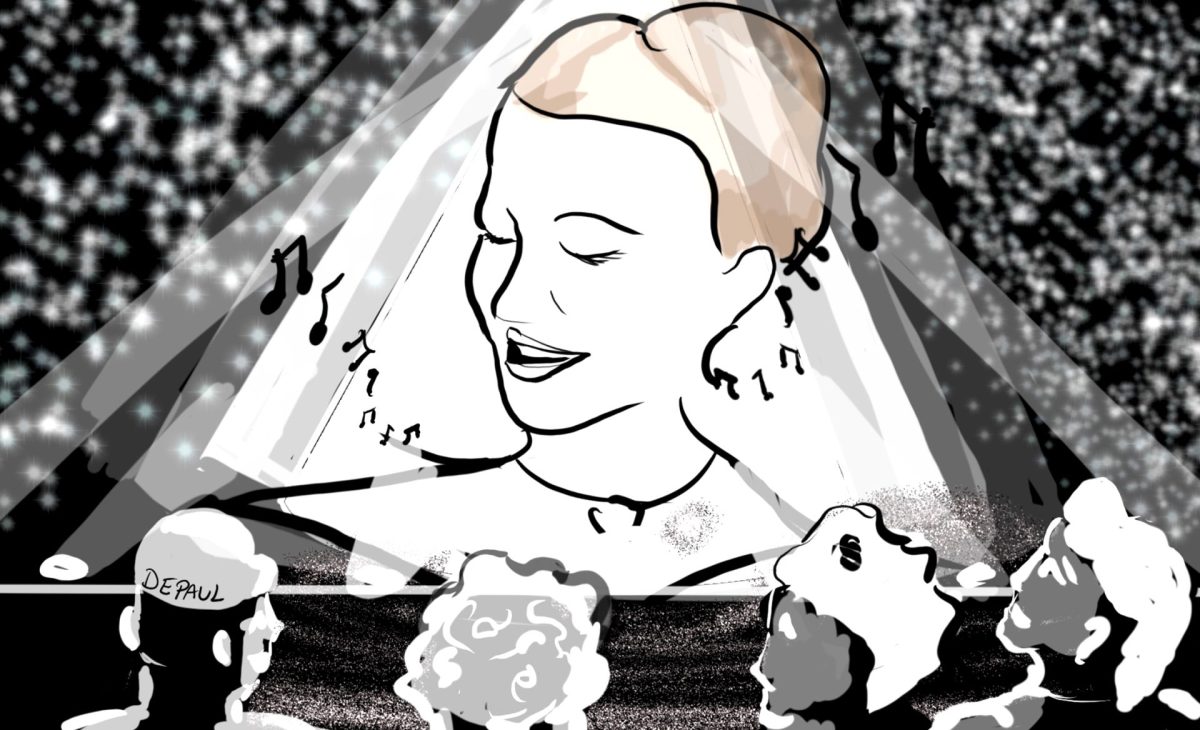At the Holtschneider Performance Center’s Allen Hall, acclaimed mezzo-soprano Viktoria Vizin’s first studio recital at the university ended with standing ovations as she and her students ended the concert with a finale featuring the entire ensemble.
Born in Hungary, Vizin has been performing in the opera since she was a child, traveling throughout Europe and the U.S. during her career. Now, she instructs the new generation of singers at DePaul’s School of Music.
Student recitals allow her to indirectly showcase her teaching abilities through the vocals of her performers. Vizin says she sees performances like these as a way to build a stronger community within the studio.
“How much more can you show support, other than making more music together?” she said.
While rehearsals only began at the start of the winter quarter, these students have been practicing their songs for much longer. Vizin chose the setlist from a catalog of pieces they’ve performed in the past.
“It’s a showcase of what we, as a studio, have been doing for the past year,” master’s student Samantha McGonigal said.
Many of the songs in the program are from “Tales of Hoffmann,” an opera that many of her students recently performed for her opera company, Vizin Virtual Ensemble.
Vizin feels that previous familiarity with the songs adds a “lovely embellishment” to the students’ renditions.
With these embellishments, each person makes their performance truly their own.
“The best thing about tonight (is that) it’s another night to tell a story,” post-master’s student Kevin Wheatle said.
Many of the songs are also in foreign languages, which gives performers the extra task of translating their music to better understand the story. Students are given language classes their freshman and sophomore years that instruct them on proper diction in these scenarios.
Sophomore Rylie Peck tries to find native speakers to listen to when practicing a song in a foreign language. According to Peck, this helps with the fluidity of her cover.
“You just get a different perspective if it’s someone that’s known the language for a really long time,” Peck said.
The endgoal for many of Vizin’s students is to establish an opera career, but there’s a long journey ahead. Many programs require applicants to be above a certain age to be considered since the voice can take a while to mature.
“Some people’s careers don’t launch until they’re forty,” student Gaby González Basurto said. “What we’re doing (here) is we’re training our vocal chords to grow in a way that’s gonna be the most beneficial to our careers.”
Since the opera scene is international, Vizin encourages her pupils to look into career options that aren’t just in Chicago, or even the U.S.
“It’s very important that they’re clear about (the possibilities) over there and over here, what the differences are, then they decide whether they really want to do it (because) there’s a lot of work over there,” Vizin said.
Junior Marco Rivera Rosa took that advice. He’ll be going to Austria this year to perform at the Vienna Summer Music Festival.
“It’s the technique, that constant work that (Vizin)’s been putting me through … all that is how I brought it to the audition,” Rivera Rosa said. “Without her, it would’ve been a completely different song.”
Vizin’s students laud her for her assiduous teaching style and its ability to help them with vocal improvement.
“She’s very well-rounded in her knowledge,” sophomore Shayla Glaser said. “If I’m not understanding what she’s saying, she’ll have three more other ways of explaining it.”
Vizin’s teaching intends to uplift her students as well as improve their vocals. Zachary Mendenhall, another student wanting to perform in Europe, attests to this, saying that Vizin has helped strengthen his ability to stop overthinking regarding his work.
“She sees your potential and she sees what you’re capable of,” González Basurto said. “Regardless of you noticing that.”
Viktoria Vizin sees opera as a way to express her emotions through the stories she tells on stage. Teaching allows her to pass that expression down to students as a legacy.
“(My goal is to) educate through artistry, and teaching is just an extension to (that),” Vizin said. “It cannot be that it dies out when I pass … it needs to be given away to the next generation.”
Related Stories:
- Indie music and performance unites Chicago at ‘Tomorrow Never Knows’
- Underground raves can be rewarding, but also dangerous for DJs
- Sara Davis Buechner concert at Holtschneider Performance Center
delivered to your inbox every Monday.
Support Student Journalism!
The DePaulia is DePaul University’s award-winning, editorially independent student newspaper. Since 1923, student journalists have produced high-quality, on-the-ground reporting that informs our campus and city.
We rely on reader support to keep doing what we do. Donations are tax deductible through DePaul's giving page.



